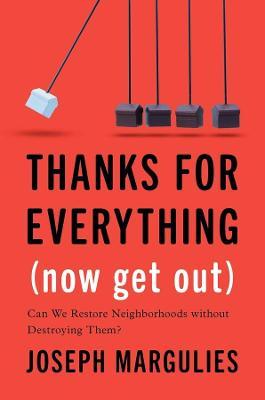Thanks for Everything (Now Get Out): Can We Restore Neighborhoods Without Destroying Them?

Thanks for Everything (Now Get Out): Can We Restore Neighborhoods Without Destroying Them?
A radical rethinking of how to make distressed urban neighborhoods more livable while preserving the residents' ability to live there "With piercing insights, Joe Margulies compellingly traces the history of one neighborhood in Providence, Rhode Island, a stand-in for distressed neighborhoods around the country. This utterly original book takes on many of our assumptions about race, poverty, and gentrification-- and tackles the toughest question of all: In restoring these places, do we set them up for destruction?"--Alex Kotlowitz, author of An American Summer When a distressed urban neighborhood gentrifies, all the ratios change: poor to rich; Black and Brown to white; unskilled to professional; vulnerable to secure. Vacant lots and toxic dumps become condos and parks. Upscale restaurants open and pawn shops close. But the low-income residents who held on when the neighborhood was at its worst, who worked so hard to make it better, are gradually driven out. For them, the neighborhood hasn't been restored so much as destroyed. Tracing the history of Olneyville, a neighborhood in Providence, Rhode Island, that has traveled the long arc from urban decay to the cusp of gentrification, Joseph Margulies asks the most important question facing cities today: Can we restore distressed neighborhoods without setting the stage for their destruction? Is failure the inevitable cost of success? Based on years of interviews and on-the-ground observation, Margulies argues that to save Olneyville and thousands of neighborhoods like it, we need to empower low-income residents by giving them ownership and control of neighborhood assets. His model for a new form of neighborhood organization--the "neighborhood trust"--is already gaining traction nationwide and promises to give the poor what they have never had in this country: the power to control their future.
Descrierea produsului
A radical rethinking of how to make distressed urban neighborhoods more livable while preserving the residents' ability to live there "With piercing insights, Joe Margulies compellingly traces the history of one neighborhood in Providence, Rhode Island, a stand-in for distressed neighborhoods around the country. This utterly original book takes on many of our assumptions about race, poverty, and gentrification-- and tackles the toughest question of all: In restoring these places, do we set them up for destruction?"--Alex Kotlowitz, author of An American Summer When a distressed urban neighborhood gentrifies, all the ratios change: poor to rich; Black and Brown to white; unskilled to professional; vulnerable to secure. Vacant lots and toxic dumps become condos and parks. Upscale restaurants open and pawn shops close. But the low-income residents who held on when the neighborhood was at its worst, who worked so hard to make it better, are gradually driven out. For them, the neighborhood hasn't been restored so much as destroyed. Tracing the history of Olneyville, a neighborhood in Providence, Rhode Island, that has traveled the long arc from urban decay to the cusp of gentrification, Joseph Margulies asks the most important question facing cities today: Can we restore distressed neighborhoods without setting the stage for their destruction? Is failure the inevitable cost of success? Based on years of interviews and on-the-ground observation, Margulies argues that to save Olneyville and thousands of neighborhoods like it, we need to empower low-income residents by giving them ownership and control of neighborhood assets. His model for a new form of neighborhood organization--the "neighborhood trust"--is already gaining traction nationwide and promises to give the poor what they have never had in this country: the power to control their future.
Detaliile produsului












